必修五 unit1 Great scientists Warming up and Reading
文档属性
| 名称 | 必修五 unit1 Great scientists Warming up and Reading | 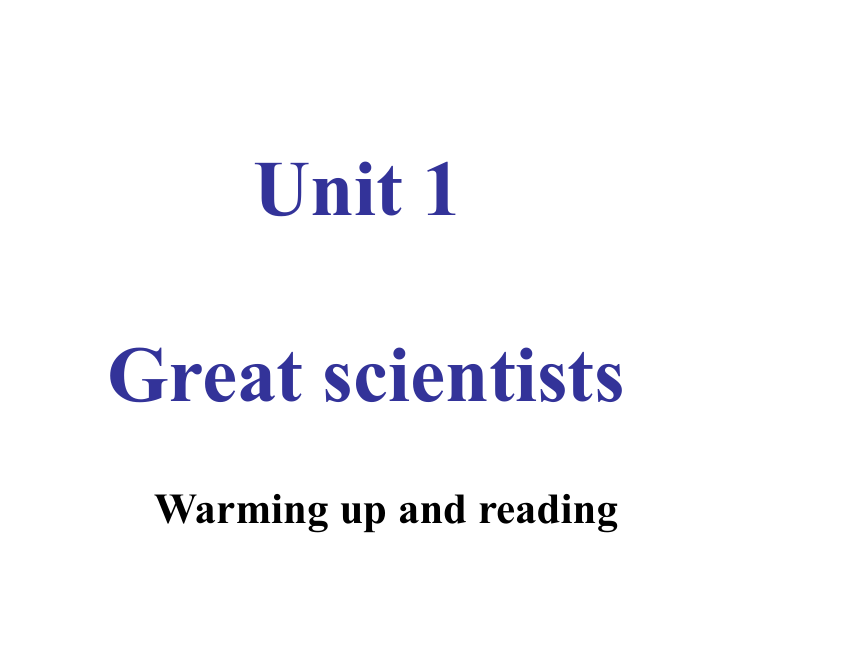 | |
| 格式 | rar | ||
| 文件大小 | 2.2MB | ||
| 资源类型 | 教案 | ||
| 版本资源 | 人教版(新课程标准) | ||
| 科目 | 英语 | ||
| 更新时间 | 2011-08-19 20:52:20 | ||
图片预览

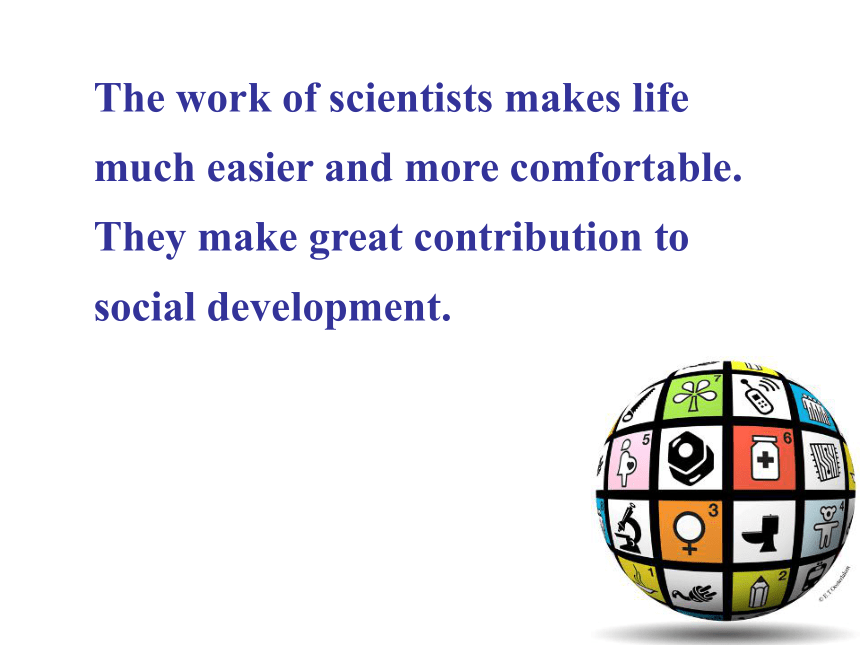
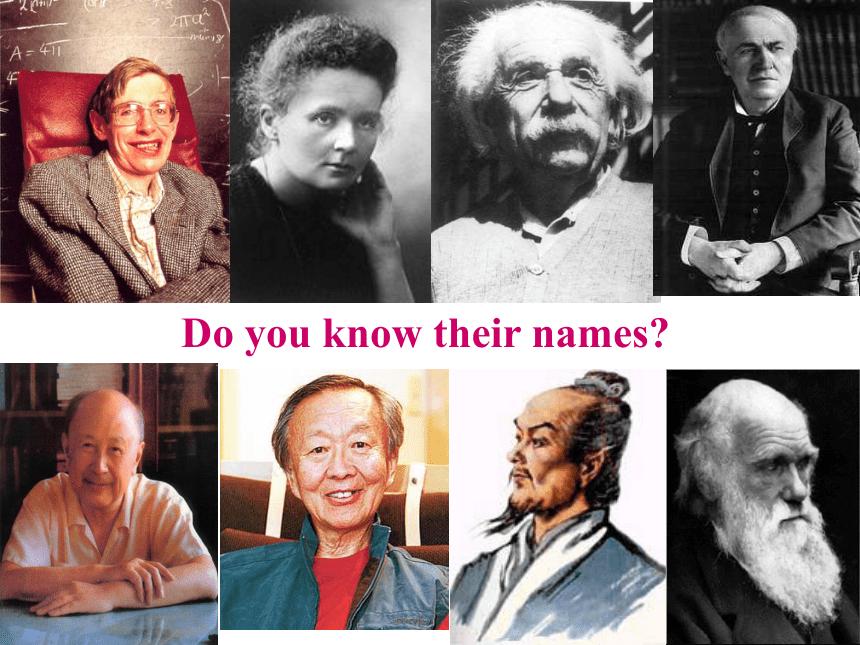
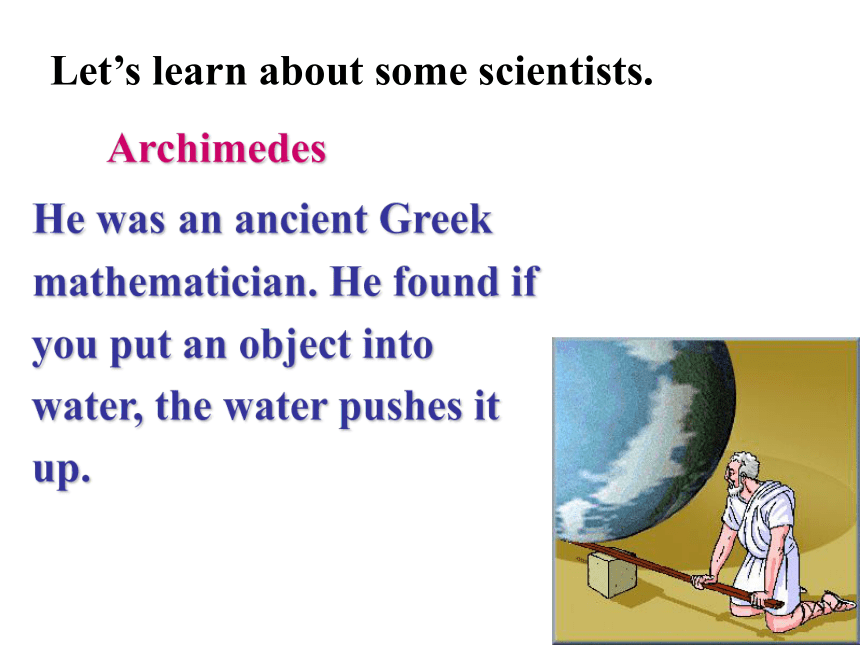
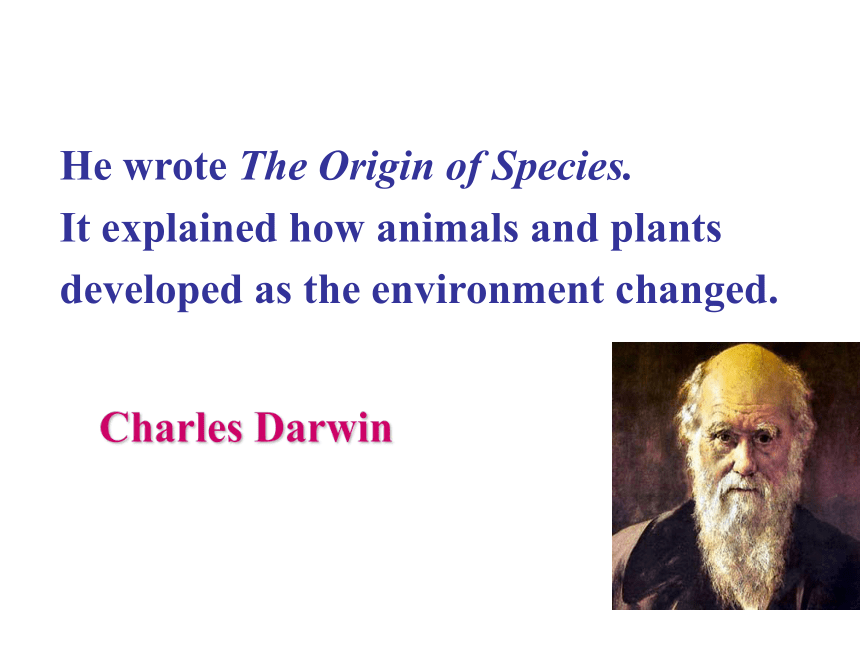
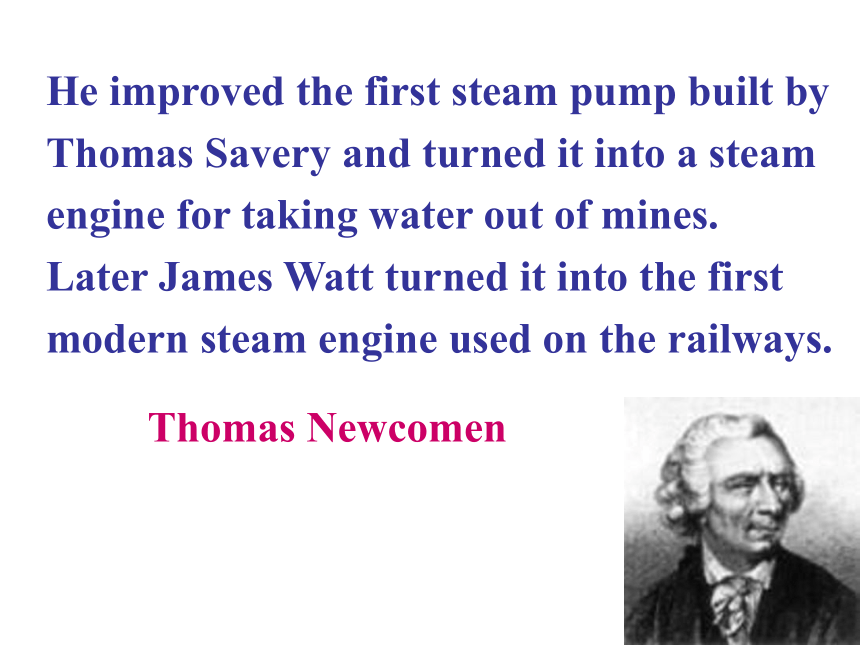
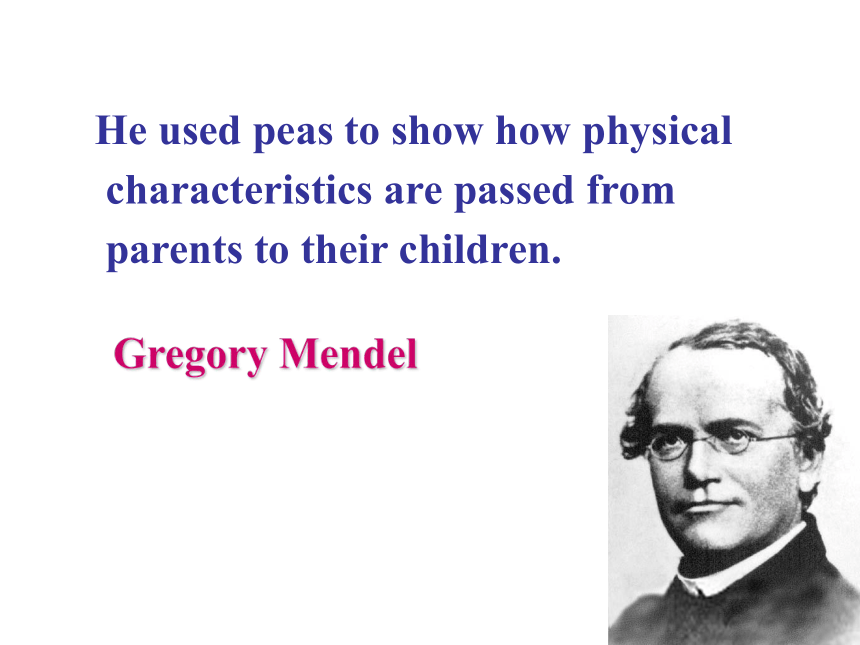
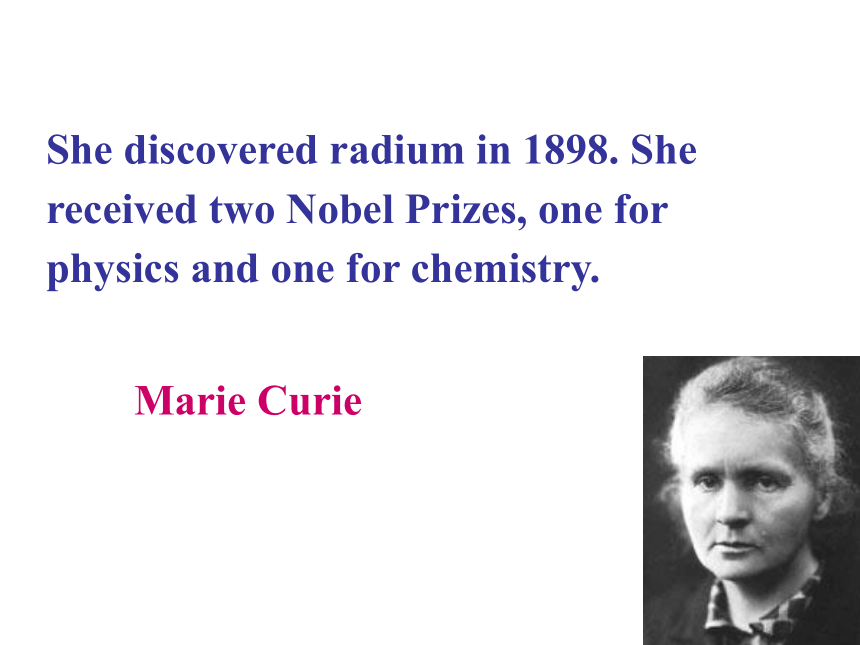
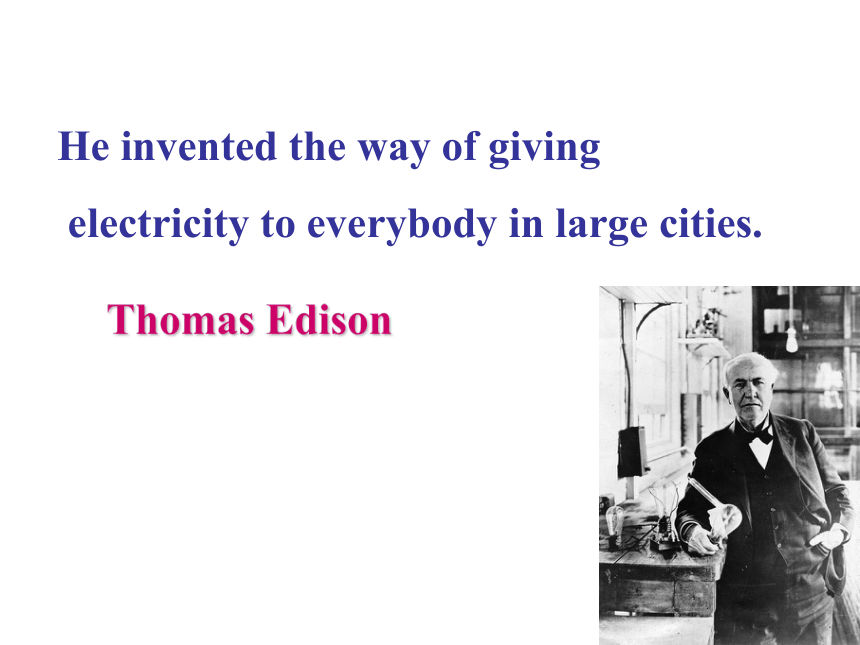
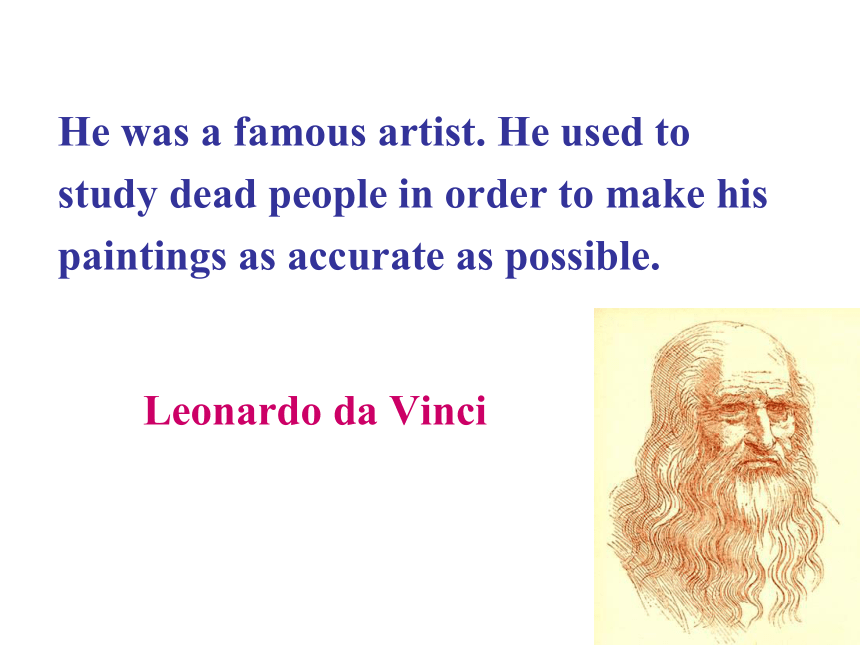
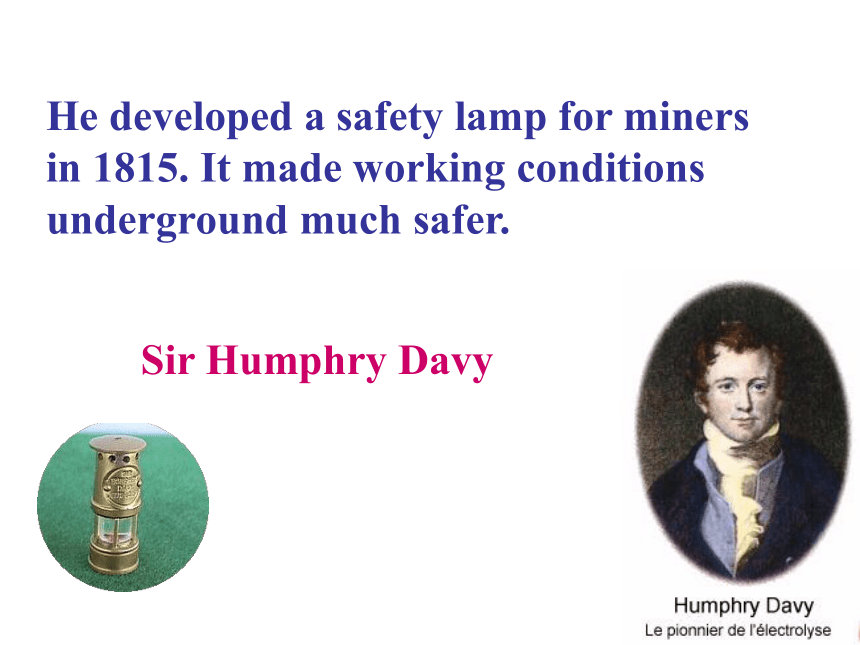
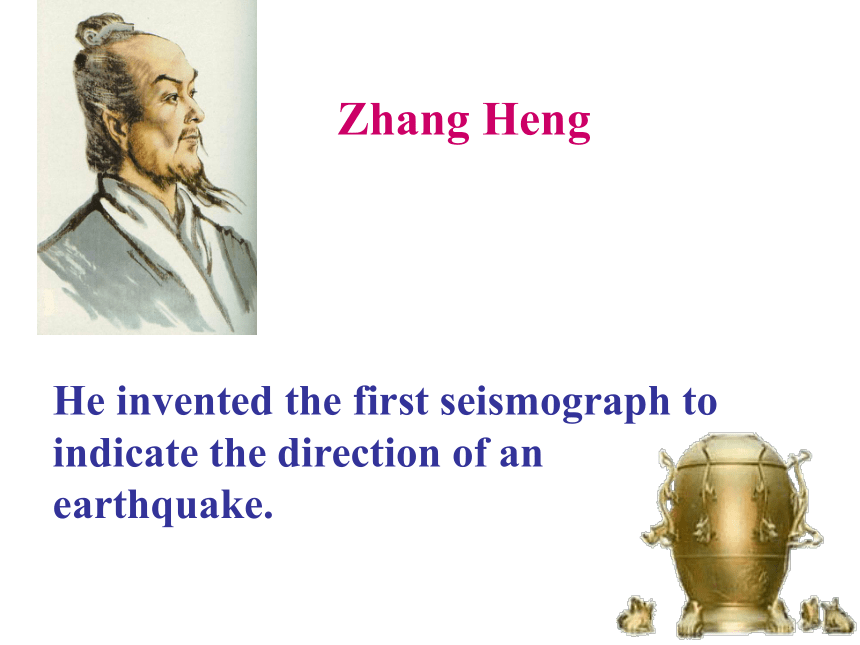
文档简介
(共38张PPT)
Unit 1
Great scientists
Warming up and reading
The work of scientists makes life much easier and more comfortable. They make great contribution to social development.
Do you know their names
Archimedes
He was an ancient Greek mathematician. He found if you put an object into water, the water pushes it up.
Let’s learn about some scientists.
He wrote The Origin of Species.
It explained how animals and plants developed as the environment changed.
Charles Darwin
He improved the first steam pump built by Thomas Savery and turned it into a steam engine for taking water out of mines.
Later James Watt turned it into the first modern steam engine used on the railways.
Thomas Newcomen
He used peas to show how physical
characteristics are passed from
parents to their children.
Gregory Mendel
She discovered radium in 1898. She received two Nobel Prizes, one for physics and one for chemistry.
Marie Curie
He invented the way of giving
electricity to everybody in large cities.
Thomas Edison
Leonardo da Vinci
He was a famous artist. He used to study dead people in order to make his paintings as accurate as possible.
He developed a safety lamp for miners in 1815. It made working conditions underground much safer.
Sir Humphry Davy
He invented the first seismograph to indicate the direction of an
earthquake.
Zhang Heng
He put forward a theory about black holes.
Stephen Harking
father of optical fibers
winning the Nobel Prize in Physics on October 6, 2009
Gao Kun
hard-working
What qualities do you think these scientists have in common
modest
prudent
steadfast
devoted
wise
conscientious
THINK
WORK
FIND
How do the scientists usually do scientific research
The process
Find a problem
Make a question
Think of a method
Collect results
Analyse the results
Find supporting evidence
Draw a conclusion
SOLVE
An infectious disease is a disease caused by bacterial, viral, fungal, or protozoan infection. Though some infectious diseases don’t spread, others may be transmitted from animal to person (bird flu and cat scratch disease) or from person to person (MRSA, HIV, and other STDs).
What infectious diseases do you know about
foot-and-mouth
disease
How to prevent infectious diseases
Wash your hands often, especially during cold and flu season.
Be aware of what you eat, and be careful how you prepare it.
Use antibiotics exactly as prescribed.
Be cautious around all wild and domestic animals that are not familiar to you.
Avoid areas of insect infestation.
What do you know about cholera
Cholera is the illness caused by a bacterium called Varian cholera. If it infects people’s intestines (肠), it may cause diarrhea, vomiting and leg cramps (抽筋). The most common cause of cholera is by eating food or drinking water that has been polluted by the bacteria.
Cholera can be mild or even without symptoms, but a severe case can lead to death without immediate treatment.
Do you know this person
John Snow ( 1813~ 1858)
a legendary figure in the history of public health, epidemiology (流行病学) and anesthesiology (麻醉学)
John Snow is considered to be one of the fathers of epidemiology, because of his work in tracing the source of a cholera outbreak in Soho, England, in 1854.
What’s the main idea of the passage
John Snow was a well-known doctor in London.
The cause of Cholera was polluted water.
The source of all drinking water should be examined.
How John Snow collected, analyzed data and found the cause of the disease and solved it .
Fast reading
Use the seven stages in setting out a new scientific idea to describe each paragraph.
Careful reading
draw a conclusion
find a problem
make up a question
think of a method
collect results
analyse the results
find supporting evidence
Para 1
Para 2
Para 3
Para 4
Para 5
Para 6
Para 7
Find a problem
What causes cholera
Make a question
Which theory is correct
Think of a method
Collect data on those who were ill
or died and where they got their
water.
Para. 1
Para. 2
Para. 3
Para. 5
Analyse the results
Analyse the water to see if that is the
cause of the illness.
Para. 6
Find supporting evidence
Find other evidence to support the
analysis.
Para. 7
Draw a conclusion
The water was to blame. The source of
all drinking water should be examined to
make sure it is safe.
Para. 4
Collect results
Plot information on a map to find out
where people died or did not die.
Who defeats “King Cholera“
What happened in 1854
How many people died in 10 days in London in 1854
Why was there no death at No. 20 and 21 Broad Street as well as at No. 8 and 9 Cambridge Street
Answer the questions.
1. Who defeats “King Cholera“
2. What happened in 1854
3. How many people died in 10 days in London in 1854
John Snow.
Cholera outbreak hit London.
500.
4. Why was there no death at No. 20 and 21 Broad Street as well as at No. 8 and 9 Cambridge Street at that time
These families had not drunk the water from the Broad Street pump.
Number these events in the order they happened.
___ John Snow began to test two theories.
___ An outbreak of cholera hit London in 1854.
___ John Snow marked the deaths on a map.
___ He announced that the water carried the disease.
___ John Snow investigated two streets where the
outbreak was very severe.
___ King Cholera was defeated.
___ He found that most of the deaths were near a
water pump.
___ He had the handle removed from the water pump.
1
2
3
4
5
6
7
8
Read the text again to get more details.
1. What was the most deadly disease in the 19th century Why
2. When could the cholera be controlled
The cholera. Because neither its cause nor its cure was understood.
John Snow knew it would never be controlled until its cause was found.
3. What is the problem
The cholera was the most deadly disease of its day. Neither its cause, nor its cure was understood.
The water was from the river which had been polluted by the dirty water from London.
4. What happened to the pump water
A woman and her daughter who lived far away but drank the water also died.
5. What extra evidence did John Snow
find
Surf the Internet to find out more about cholera.
Write down the important words and phrases in your exercise book.
Underline the difficult sentences that you cannot understand.
Unit 1
Great scientists
Warming up and reading
The work of scientists makes life much easier and more comfortable. They make great contribution to social development.
Do you know their names
Archimedes
He was an ancient Greek mathematician. He found if you put an object into water, the water pushes it up.
Let’s learn about some scientists.
He wrote The Origin of Species.
It explained how animals and plants developed as the environment changed.
Charles Darwin
He improved the first steam pump built by Thomas Savery and turned it into a steam engine for taking water out of mines.
Later James Watt turned it into the first modern steam engine used on the railways.
Thomas Newcomen
He used peas to show how physical
characteristics are passed from
parents to their children.
Gregory Mendel
She discovered radium in 1898. She received two Nobel Prizes, one for physics and one for chemistry.
Marie Curie
He invented the way of giving
electricity to everybody in large cities.
Thomas Edison
Leonardo da Vinci
He was a famous artist. He used to study dead people in order to make his paintings as accurate as possible.
He developed a safety lamp for miners in 1815. It made working conditions underground much safer.
Sir Humphry Davy
He invented the first seismograph to indicate the direction of an
earthquake.
Zhang Heng
He put forward a theory about black holes.
Stephen Harking
father of optical fibers
winning the Nobel Prize in Physics on October 6, 2009
Gao Kun
hard-working
What qualities do you think these scientists have in common
modest
prudent
steadfast
devoted
wise
conscientious
THINK
WORK
FIND
How do the scientists usually do scientific research
The process
Find a problem
Make a question
Think of a method
Collect results
Analyse the results
Find supporting evidence
Draw a conclusion
SOLVE
An infectious disease is a disease caused by bacterial, viral, fungal, or protozoan infection. Though some infectious diseases don’t spread, others may be transmitted from animal to person (bird flu and cat scratch disease) or from person to person (MRSA, HIV, and other STDs).
What infectious diseases do you know about
foot-and-mouth
disease
How to prevent infectious diseases
Wash your hands often, especially during cold and flu season.
Be aware of what you eat, and be careful how you prepare it.
Use antibiotics exactly as prescribed.
Be cautious around all wild and domestic animals that are not familiar to you.
Avoid areas of insect infestation.
What do you know about cholera
Cholera is the illness caused by a bacterium called Varian cholera. If it infects people’s intestines (肠), it may cause diarrhea, vomiting and leg cramps (抽筋). The most common cause of cholera is by eating food or drinking water that has been polluted by the bacteria.
Cholera can be mild or even without symptoms, but a severe case can lead to death without immediate treatment.
Do you know this person
John Snow ( 1813~ 1858)
a legendary figure in the history of public health, epidemiology (流行病学) and anesthesiology (麻醉学)
John Snow is considered to be one of the fathers of epidemiology, because of his work in tracing the source of a cholera outbreak in Soho, England, in 1854.
What’s the main idea of the passage
John Snow was a well-known doctor in London.
The cause of Cholera was polluted water.
The source of all drinking water should be examined.
How John Snow collected, analyzed data and found the cause of the disease and solved it .
Fast reading
Use the seven stages in setting out a new scientific idea to describe each paragraph.
Careful reading
draw a conclusion
find a problem
make up a question
think of a method
collect results
analyse the results
find supporting evidence
Para 1
Para 2
Para 3
Para 4
Para 5
Para 6
Para 7
Find a problem
What causes cholera
Make a question
Which theory is correct
Think of a method
Collect data on those who were ill
or died and where they got their
water.
Para. 1
Para. 2
Para. 3
Para. 5
Analyse the results
Analyse the water to see if that is the
cause of the illness.
Para. 6
Find supporting evidence
Find other evidence to support the
analysis.
Para. 7
Draw a conclusion
The water was to blame. The source of
all drinking water should be examined to
make sure it is safe.
Para. 4
Collect results
Plot information on a map to find out
where people died or did not die.
Who defeats “King Cholera“
What happened in 1854
How many people died in 10 days in London in 1854
Why was there no death at No. 20 and 21 Broad Street as well as at No. 8 and 9 Cambridge Street
Answer the questions.
1. Who defeats “King Cholera“
2. What happened in 1854
3. How many people died in 10 days in London in 1854
John Snow.
Cholera outbreak hit London.
500.
4. Why was there no death at No. 20 and 21 Broad Street as well as at No. 8 and 9 Cambridge Street at that time
These families had not drunk the water from the Broad Street pump.
Number these events in the order they happened.
___ John Snow began to test two theories.
___ An outbreak of cholera hit London in 1854.
___ John Snow marked the deaths on a map.
___ He announced that the water carried the disease.
___ John Snow investigated two streets where the
outbreak was very severe.
___ King Cholera was defeated.
___ He found that most of the deaths were near a
water pump.
___ He had the handle removed from the water pump.
1
2
3
4
5
6
7
8
Read the text again to get more details.
1. What was the most deadly disease in the 19th century Why
2. When could the cholera be controlled
The cholera. Because neither its cause nor its cure was understood.
John Snow knew it would never be controlled until its cause was found.
3. What is the problem
The cholera was the most deadly disease of its day. Neither its cause, nor its cure was understood.
The water was from the river which had been polluted by the dirty water from London.
4. What happened to the pump water
A woman and her daughter who lived far away but drank the water also died.
5. What extra evidence did John Snow
find
Surf the Internet to find out more about cholera.
Write down the important words and phrases in your exercise book.
Underline the difficult sentences that you cannot understand.
